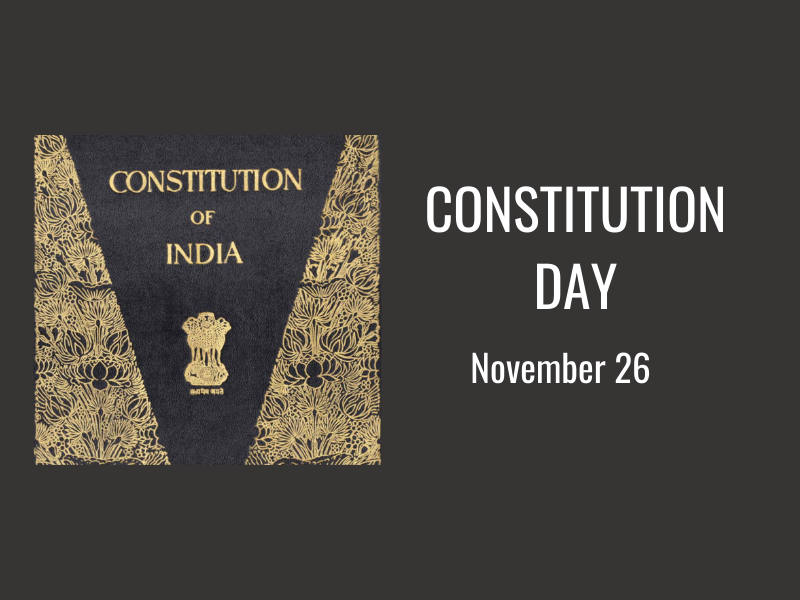Constitution Day (National Law Day), also known as Samvidhan Divas, is observed on November 26 every year to commemorate the Constitution of India.
Previously celebrated as Law Day, November 26 was declared as Constitution Day by prime minister Narendra Modi on October 11, 2015 while laying the foundation stone of the B. R. Ambedkar’s Statue of Equality memorial in Mumbai. The year 2015 marked the 125th birth anniversary of Ambedkar – the father of the Indian Constitution.
The demand for a Constituent Assembly was first made by M.N. Roy – a communist party leader – and later pursued by the Congress party. In 1940, the British government accepted the demand and allowed Indians to draft the Indian Constitution.
The first Constituent Assembly meeting presided by Dr. Sachchidananda Sinha was held on December 9, 1946.
On August 29, 1947, a drafting committee under the chairmanship of Dr B.R. Ambedkar was constituted to prepare a draft constitution.
There were a total of 11 sessions held between December 9, 1946 and January 24, 1950. During this period between the adoption and enforcement, there were over 2000 amendments made to the draft after much debate and discussion.
On January 24, 1950, the drafting of the constitution was accomplished when the members signed two handwritten copies of the document one each in Hindi and English.
On January 26, 1950, the Constitution of India came into force and became the law of the land. This day is commemorated as Republic Day.
Indian constitution is the most unique and the longest written constitution in the world which originally had 395 articles, divided into 22 parts and 8 schedules. At present, our constitution contains 448 articles, with 12 schedules.
The Indian Constitution is drawn from constitutions of various nations such as England, USA, France, the USSR, South Africa etc.
According to Article 368 of the constitution, the Parliament can make amendments to the constitution as per the needs. However the Apex Court held that except the basic structure every part of the constitution can be modified. Any old or new law violating the basic structure of the constitution is unconstitutional and will be invalidated by the courts.
The Constitution of India identifies only single citizenship. In the United States, there is provision of dual citizenship. In India, people are citizens of India only, not of the respective states to which they belong. This provision would help to promote harmony and integrity of the nation.
The 44th Amendment Act of 1979 guarantees Indian citizens six fundamental rights which are Right to Equality, Right to Freedom, Right to freedom of Religion, Cultural and Educational Rights, Right against Exploitation and Right to Constitutional Remedies (Article 32). The fundamental rights are not absolute and are subject to certain limitations that are mentioned in the constitution itself.
Part IVA (Article 51 A) of the Constitution describes various Fundamental Duties of each citizen.
Directive Principles of State Policy mentions certain guidelines for the State with the objective of socio-economic development. All three governments of the country, Central, State, and Local are expected to frame welfare policies in accordance with this part of the Constitution.
The Constitution of India is said to strike the perfect balance between rigidity and flexibility. Some provisions of the Constitution can be amended very easily while the others can only be amended by complex processes.
Universal Adult Franchise promotes the policy of ‘one person one vote’. Every individual of 18 years and above has the right to vote irrespective of their age, gender, race, colour, religion, etc.
The Preamble of Constitution, amended by the 42nd Constitutional Amendment Act in 1976, states WE, THE PEOPLE OF INDIA, having solemnly resolved to constitute India into a SOVEREIGN SOCIALIST SECULAR DEMOCRATIC REPUBLIC and to secure to all its citizens:
JUSTICE, social, economic and political; LIBERTY of thought, expression, belief, faith and worship;
EQUALITY of status and of opportunity; and to promote among them all
FRATERNITY assuring the dignity of the individual and the unity and integrity of the Nation.
The judiciary keeps an eye on the functioning of the legislature and the executive and if the judiciary feels that there is need of some more effective policies or laws on a certain topic of public or national importance, the judiciary can
suggest or make temporary laws in favour of those topics.
The Constitution gives the judiciary a right to review each law and further declare them as unconstitutional or invalid according to the decisions.
